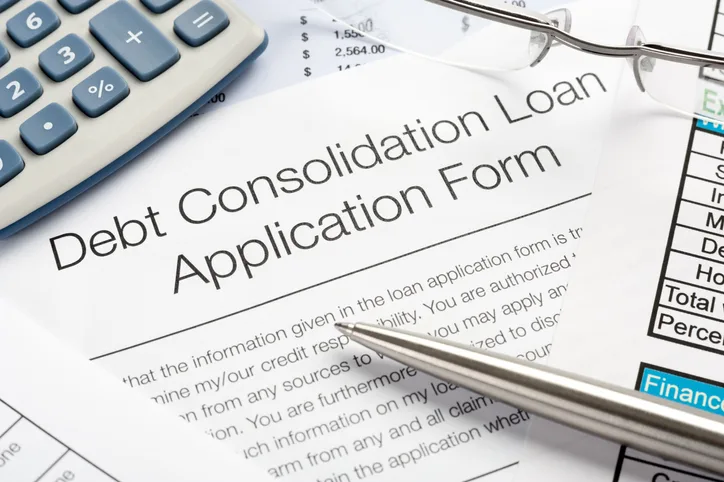5 ways to consolidate your debt and break the cycle
As we head towards the end of the first month of the new decade, have you taken steps to pay off your debt?
 Finder's Smarter Finances series is presented by Wisr personal loans.
Finder's Smarter Finances series is presented by Wisr personal loans.Get a fairer, personalised interest rate up to 5% lower than the Big Four banks for strong credit. Find out more.
January is a time for getting your act together after the overindulgence of the Christmas period. To bounce back, some of us hit the gym, others stave off the booze and some of us decide that it's time to get our finances in order. And a good place to start is to consolidate your debt.
Earlier this month, Finder found that over 7.2 million Aussies would be nursing a Christmas-induced financial hangover this January that could take months to recover from. And that's not even taking into account the millions of Australians with pre-existing credit card debt, car loans, personal loans, unpaid fines/phone bills and student debt.
On a positive note, 22% of Australians resolved to get out of debt this year. But, as January draws to a close, how many of those people have kept up with their New Year's resolution?
For those of you whose resolve has dissolved, or who simply still can't shake the debt headache, we've come up with 5 possible solutions that could help you to consolidate your debt and get you back on track. Break the cycle of debt today.
1. Personal loans
A personal loan is one of the most popular methods of consolidating debt. This is because some personal loans, specifically debt consolidation personal loans, can be used to pay off almost any form of debt.
So if, for example, you have some credit card debt, a car loan, an unpaid phone bill and an existing personal loan, you may be able to consolidate them all with a debt consolidation personal loan.
How does it work?
Getting a personal loan to consolidate debt works by opting for a loan with a lower rate than the overall rate of your current debt. This can be as simple as opting for a personal loan with a rate of 6.99% p.a. to repay a personal loan with a rate of 15% p.a. If you have multiple debts, it could take a bit more working out.
Debt consolidation loans are usually unsecured personal loans, but some lenders may require asset security, depending on your circumstances and the product they offer.
What are the benefits?
Some of the benefits of opting for a personal loan to consolidate your debt include:
- Paying off multiple debts with one loan
- Reducing your interest payments/the overall cost of your debt
- Reducing payments to a single regular payment
Top tip:
If you're looking to chip away at your debt without taking out another form of finance, there are tools like the Wisr App which helps you pay down your debt by rounding up your daily transactions. Find out more.

2. P2P lending
P2P (peer-to-peer) loans are another form of personal loan that can be used to consolidate debt. Much like a standard personal loan, taking out a P2P loan to consolidate your debt requires that you opt for a loan with a lower rate than that which you are currently paying.
How does it work?
A P2P loan, unlike a standard personal loan, involves borrowing money from collective of individual investors as opposed to a bank, building society or credit union. The "lender" is instead a platform provider who acts as a facilitator for a portfolio of consumer loans, funded by investors. Investors make money on the interest paid by borrowers, while the platform usually charges application and/or admin fees to the borrower.
P2P loan interest rates are generated on a personalised basis. This means that the stronger your credit, the lower your rate. This is, therefore, a potentially beneficial option for borrowers whose credit has improved since taking out their previous loans.
Like standard personal loans, P2P personal loans can usually be used to pay off any form of debt.
What are the benefits?
There are a number of benefits to opting for a P2P loan:
- They're generally offered at lower rates than the banks
- They're usually processed faster and fully online, so you can get your debt sorted more quickly
- It's personalised lending, so you can get rewarded for good credit
What to watch out for
If you have a substantial amount of debt (usually over $35,000), you may not be able to consolidate your debt with a P2P loan. This is because P2P lenders generally offer lower amounts than the bigger banks.
Also, it's a good idea to double check the fees when opting for a P2P loan, as some platforms may offer low rates but charge high admin and application fees.
3. Balance transfer credit cards
A balance transfer credit card allows you to move your current credit card debt onto a lower or 0% interest credit card. Many credit card companies have introductory offers of 0% interest for their balance transfer credit cards that can last anywhere from 6 to 36 months.
If you're struggling with credit card debt, a balance transfer credit card might be right for you.

How does it work?
Balance transfer credit cards work by allowing borrowers to transfer their existing credit card debt onto a new card that charges lower or no interest. This means that you'll save interest on your credit card repayments (however, some credit card companies will charge you up to 3% of your balance for moving it to a new card).
If you transfer to a card with a 0% interest introductory offer, the aim is to pay off your credit card debt before the introductory period ends. This is because, at the end of this promotional period, the provider will usually charge much a higher interest rate.
What are the benefits?
There are a number of benefits to opting for a balance transfer card:
- Save money on interest by paying 0% for the introductory period
- Pay off your credit card debt faster
- Use the money saved on your credit cards to pay off other debts
What to watch out for
Be aware that most balance transfer credit cards can only be used in relation to credit card debt. You usually can't transfer a personal loan onto a 0% interest credit card. However, some balance transfer credit cards do allow it, but it's essential that you check with the provider before signing up if you wish to transfer your personal loan debt.
This means that if you're looking to consolidate more than one type of debt, a balance transfer credit card might not be right for you. However, you could use the money saved on your credit cards to put towards other debt payments, if you're organised.
Beware of balance transfer fees and be careful that you don't outstay the introductory period. Ensure that you have a budget in place so that you can pay off your debt before the 0% introductory offer ends, or you could end up back at square one.
4. Refinancing
If you are a homeowner, you may be able to consolidate your debts by refinancing your home loan.
How does it work?
Refinancing your home loan for debt consolidation means that you combine your existing debts (including your home loan) and make a switch to a new mortgage. This allows you to make one single monthly repayment, rather than lots of individual debt payments.
In order to make this worthwhile, you have to ensure that the home loan you are switching to has a lower rate than your current home loan. You also have to do the maths in regards to your current debts and make sure that everything adds up so that you are in fact actually saving money.
What are the benefits?
There are a number of benefits to refinancing for debt consolidation:
- Home loans generally have a lower interest rate than personal loans, meaning your monthly repayments will be lower
- You'll have one convenient monthly repayment
- You can take advantage of new customer discounts from lenders
What to watch out for
Refinancing can seem like a cheaper option because of the lower rates of home loans in comparison to personal loans, but be aware that turning short term debts into long term debts can have negative ramifications financially.
Switching your home loan can also be a lengthy process, which includes a lot of paperwork, exit penalty fees from your current provider and government charges. So make sure it's the right choice for you before opting to make the switch.
5. Bad credit debt consolidation
For those who struggle with bad credit, there are a number of debt consolidation options as well as debt management services that are available.

How does it work?
Debt consolidation when you have bad credit can go a few ways. The most notable two are a bad credit debt consolidation loan or a Part 9 Debt Agreement.
- Bad credit debt consolidation loan. Specialist lenders offer personal loans to people with bad credit in order to consolidate their debt into one place. The interest rates on these loans will be higher than average personal loans.
- Part 9 Debt Agreement. This is a form of bankruptcy. If you are facing debt stress, a financier may be able to negotiate on your behalf to prevent interest accruing on your loans. This agreement is listed on a person's credit file for five years.
What are the benefits?
Benefits to bad credit debt consolidation include:
- It may reduce your repayments (debt consolidation loan)
- You can halt your interest payments (Part 9 Agreement)
- You can reduce debt stress
What to watch out for
If opting for a bad credit debt consolidation loan, you may find that your repayments are no lower than previously, because of the higher rates offered to people with poor credit. This is because people with poor credit pose a higher risk.
For those opting for a Part 9 Debt Agreement, you may benefit from lower repayments, but your credit history will suffer further damage and for a longer period of time. Be sure that you are unable to meet your current repayments before opting for a Part 9 Debt Agreement.
If you are struggling with your personal finances, consider speaking to a professional financial counsellor by calling the National Debt Helpline on 1800 007 007.
Sponsor video

Latest headlines
-
All the big savings account interest rate rises: ING, AMP, Westpac + more
6 Feb 2026 |
-
Australian credit card debt soars 10% in a year: How can you escape the trap?
6 Feb 2026 |
-
4 cashback home loan offers to ease the pain of RBA rate hike
4 Feb 2026 |
-
Finder’s RBA Survey: Easing cycle ends as RBA delivers first rate hike since 2023
4 Feb 2026 |
-
Ubank Save is increasing its bonus rate up to 5.35% p.a.
3 Feb 2026 |




